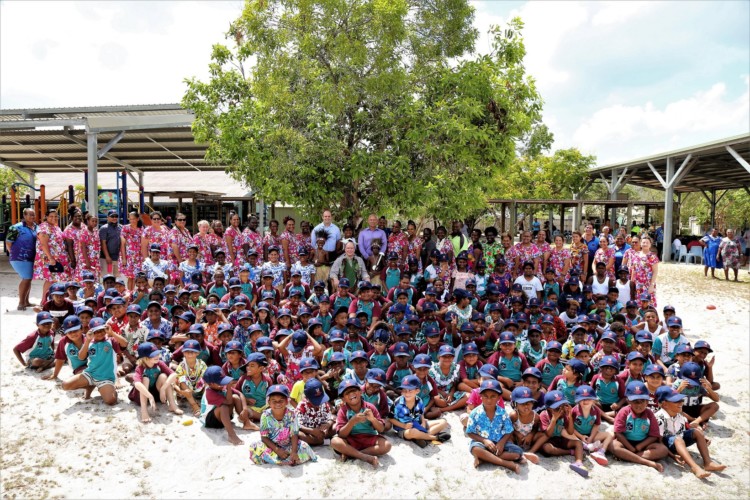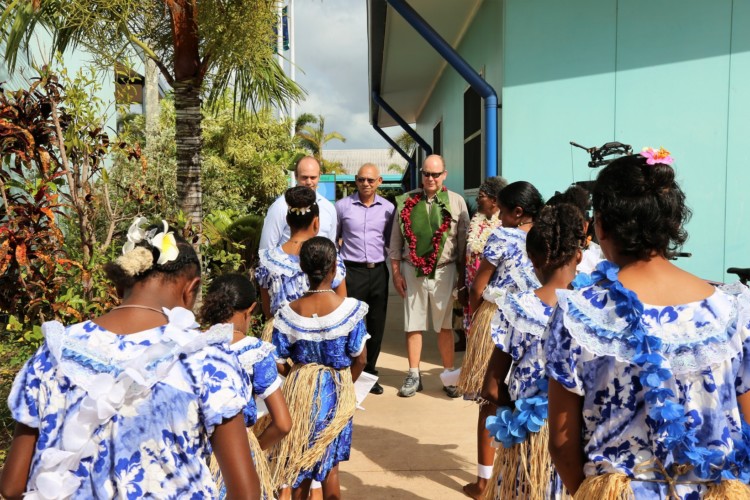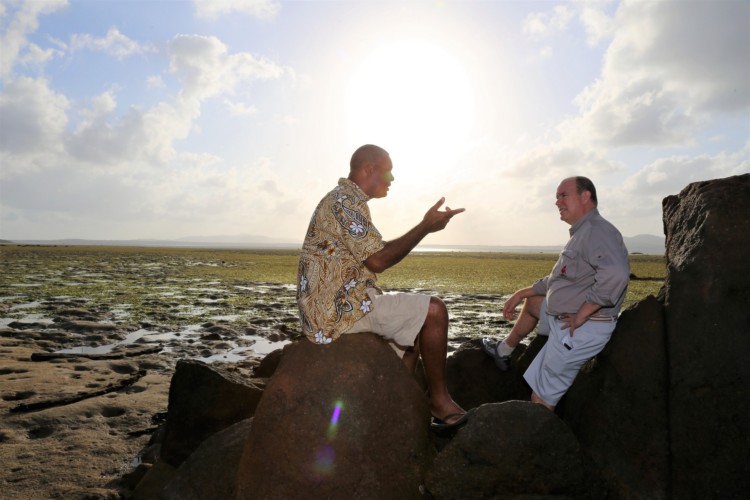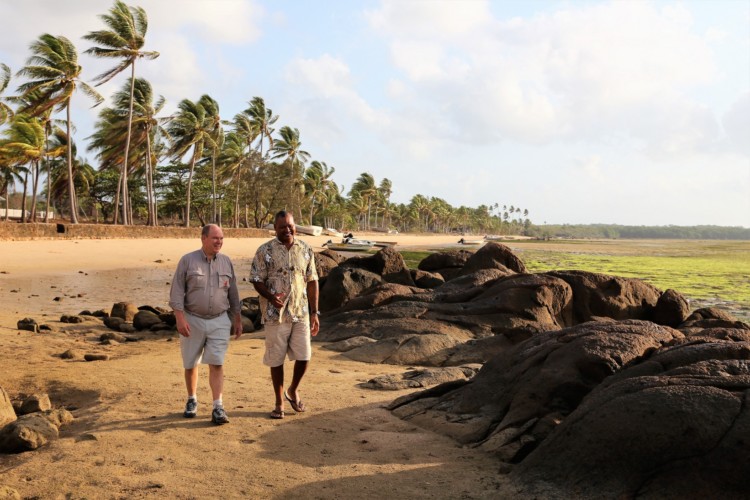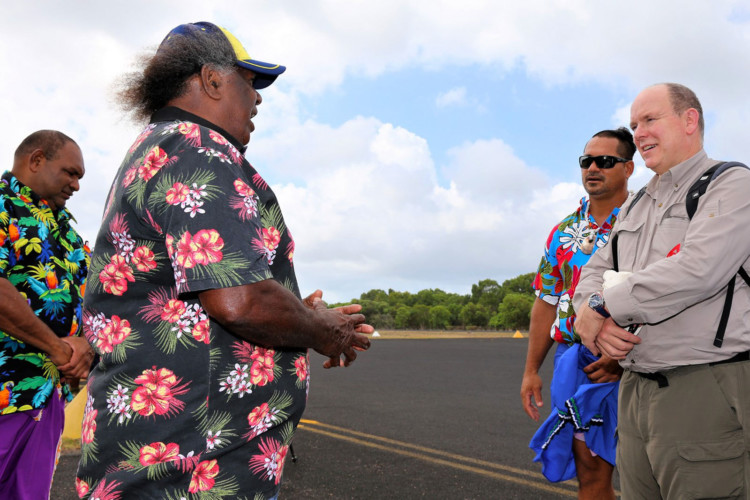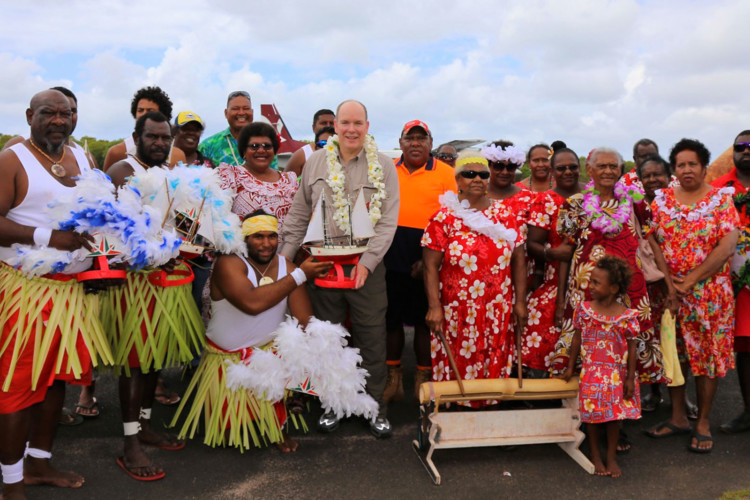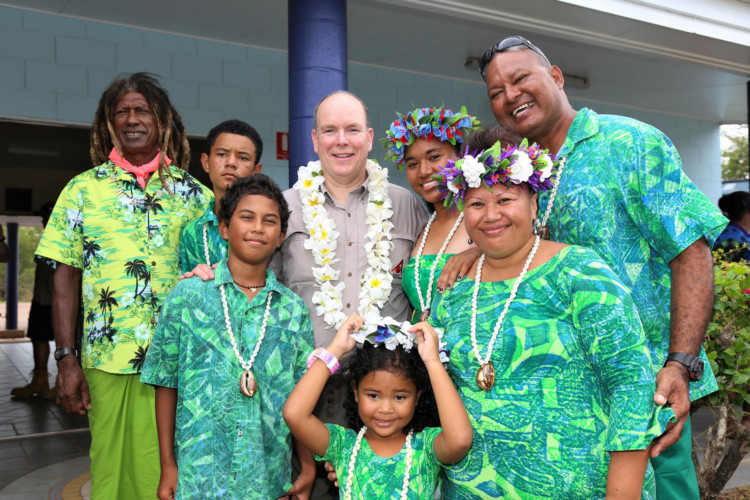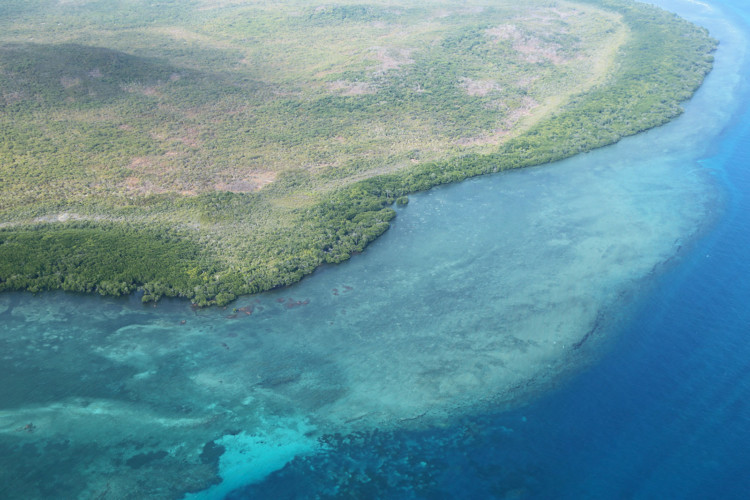After two days at the 2018 Our Ocean Conference in Bali, Indonesia, Monaco Explorations joins HSH Prince Albert II for a new mission on the small island of Badu. The island is situated in the Torres Strait, which separates Australia from Papua New Guinea. This mission’s purpose is four days immersion into the culture of the Torres Strait Islanders.
The marine environment is very much a part of the Badugal people’s ancestral traditions and is woven into the rhythm of their daily lives. Their art is also full of marine life, ocean legends and totems of marine animals. For this reason, many local Torres Strait artists participated in the 2016 Taba Naba exhibition at the Oceanographic Museum of Monaco. Among them was Alick Tipoti from Badu, who met with HSH Prince Albert II during the art exhibition. Although living in two apparently opposite societies, the artist and the Head of State share a common vision: that of a balanced and respectful relationship between man and nature. A bond was formed, and here we are two years later and 14,000km from the Principality of Monaco as the two men collaborate to address the challenges facing these island regions.

On October 31st the entire community, from the elders and guardians of island memory, to the children, have been performing dances and customary songs for days, eagerly awaiting the arrival of the Sovereign Prince.

After a reception by the local authorities, artist Alick Tipoti and HSH Prince Albert spoke privately along the island shores. The two discussed, in particular, the problems of erosion of the island coasts during the high tides (also known as “king’s tides”) and the disappearance of the corals. These remote islands are at the forefront of the effects of human activity. From plastic pollution to driftnets and global warming, these dangers, sometimes impalpable, feed the evolution of worry for the islanders.
HSH Prince Albert is the first Western Head of State to visit Badu, and Alick Tipoti and the entire island community were eager to share their worries, experiences, and future hopes with this environmental spokesperson. In doing so, there is an expectation that small island communities such as theirs will be considered equitably during global climate negotiations.

While snorkeling with hopes of encountering some marine turtles and dugongs, the effects of global warming, and consequently multiple bleaching episodes, on the Torres Strait coral reefs were evident. The most severe bleaching episodes have apparently occurred in Australia, suggesting that a majority of corals have died in parts of the Great Barrier Reef. HSH Prince Albert was able to testify to what he witnessed here only a few days later during his meeting with the teams of the Australian Institute of Marine Science and the Great Barrier Marine Park Authority.

To be able to speak with the highest of authority on marine matters, to the most influential decision makers around the world, it is essential to see first-hand and understand island territories such as Badu, which are the places most exposed to the climate change. To meet Monaco Exploration’s goal of reconciling humanity with the sea, we must first understand and experience the relationship that drives this interaction.
Thus, any knowledge and experience that the “elders” will share is crucial. We have asked them: What relationship do you have with nature? How do you use resources? What impact does climate change have on your society? How is your way of life influenced by the Western world?

We have much to learn from island communities and their relationship to the sea. Far from our anthropocentric vision – which places man at the center of the world – these first peoples embrace a holistic vision of nature: plants, animals and men all part of a whole, a global sphere. Although widespread for millennia, this approach is showing its first signs of weakening at an alarming pace under the influence of the dominant Western way of life.
HSH Prince Albert was particularly sensitive to the concerns of these populations in the face of threats posed by globalization, not only to the physical environment but also to their societal future. The erosion of the coast of Badu, combined with the erosion of their ancestral culture, makes them fear the disappearance of their home and their way of life, language and heritage.
The balance that these first human societies maintain with nature appears more than fragile. On one hand, there is the need to evolve and the desire to develop. On the other, a cultural identity rooted in a sacred relationship to the natural world. And so, we realize that this small, insular community of only 200 to 300 souls is at a crossroads.

We hope that the Badulgal people will discover a path, one that demonstrates that economic development and the maintenance of tradition are not only enemies, but can be complementary, necessary, and profitable to communities such as theirs. This path could be that of the circular economy, to preserve our ecosystem and break from the linear economy widely adopted by Western societies (produce, consume, discard).
The interdependence of the Badulgal people and their environment (nature provides for their needs and they strive to maintain it in return), their way of exploiting resources, their knowledge of and interactions with the marine world are all examples for our modern societies, as well as for the message delivered by HSH Prince Albert II to his peers.
HSH Prince Albert II of Monaco took part in an aquatic hike in the beautiful grounds surrounding the island of Badu.
Hoping for a few encounters with marine turtles and Dugongs, the Sovereign has instead seen the effects of global warming on Torres Strait coral reefs, which have suffered from severe and repeated bleaching episodes in recent years. A degradation that he will be able to testify to this week at the International Coral Reef Initiative (ICRI) conferences in Townsville, Australia, where Monaco is co-chairing this year.
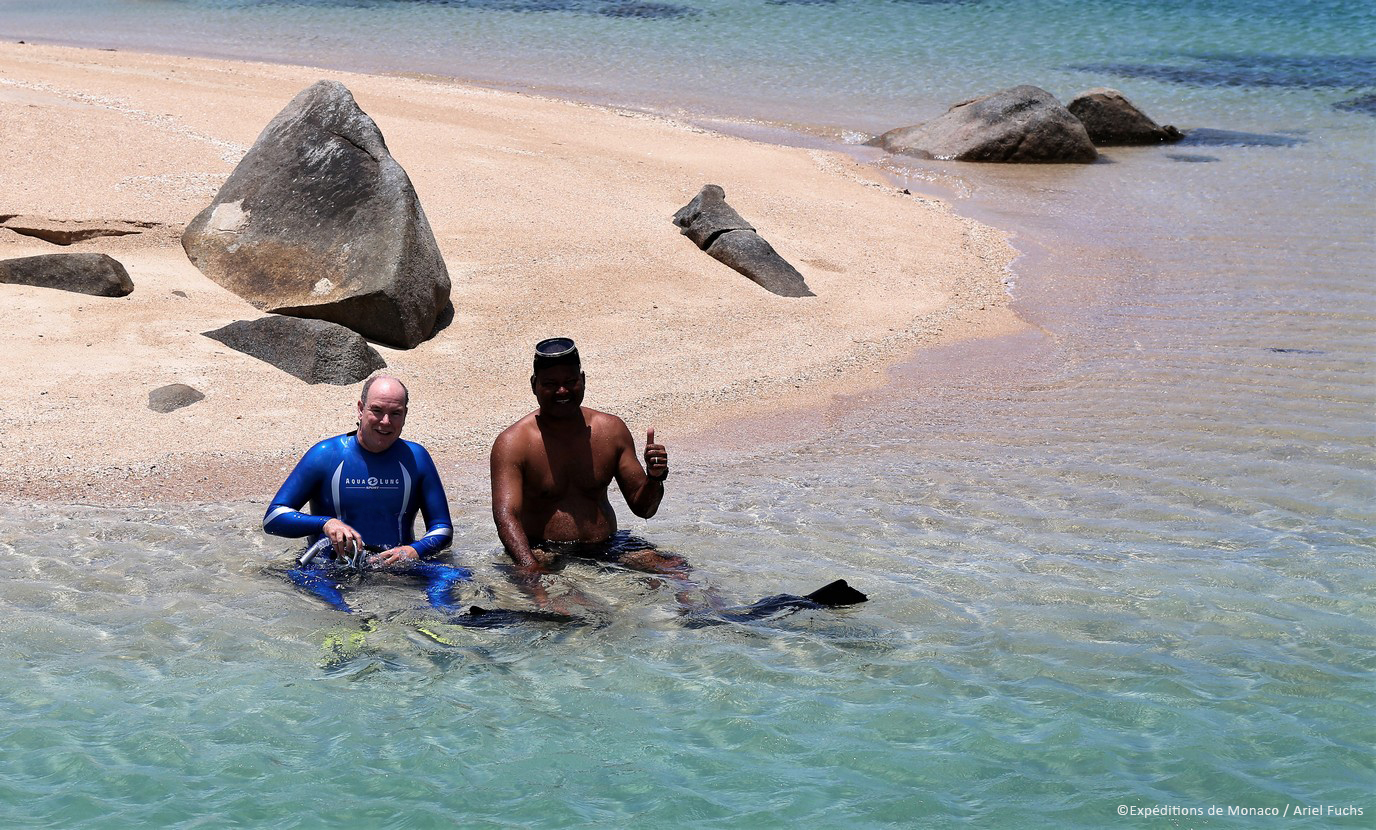
In Badu, planting a young coconut palm tree is a way to leave one’s footprint in the ancestral territory. It is also a tribute of respect to Mother Nature, and an act of faith to ensure the revival and the sustainability of all life. It was more than an honor for HSH Prince Albert to participate in this important and meaningful tradition.
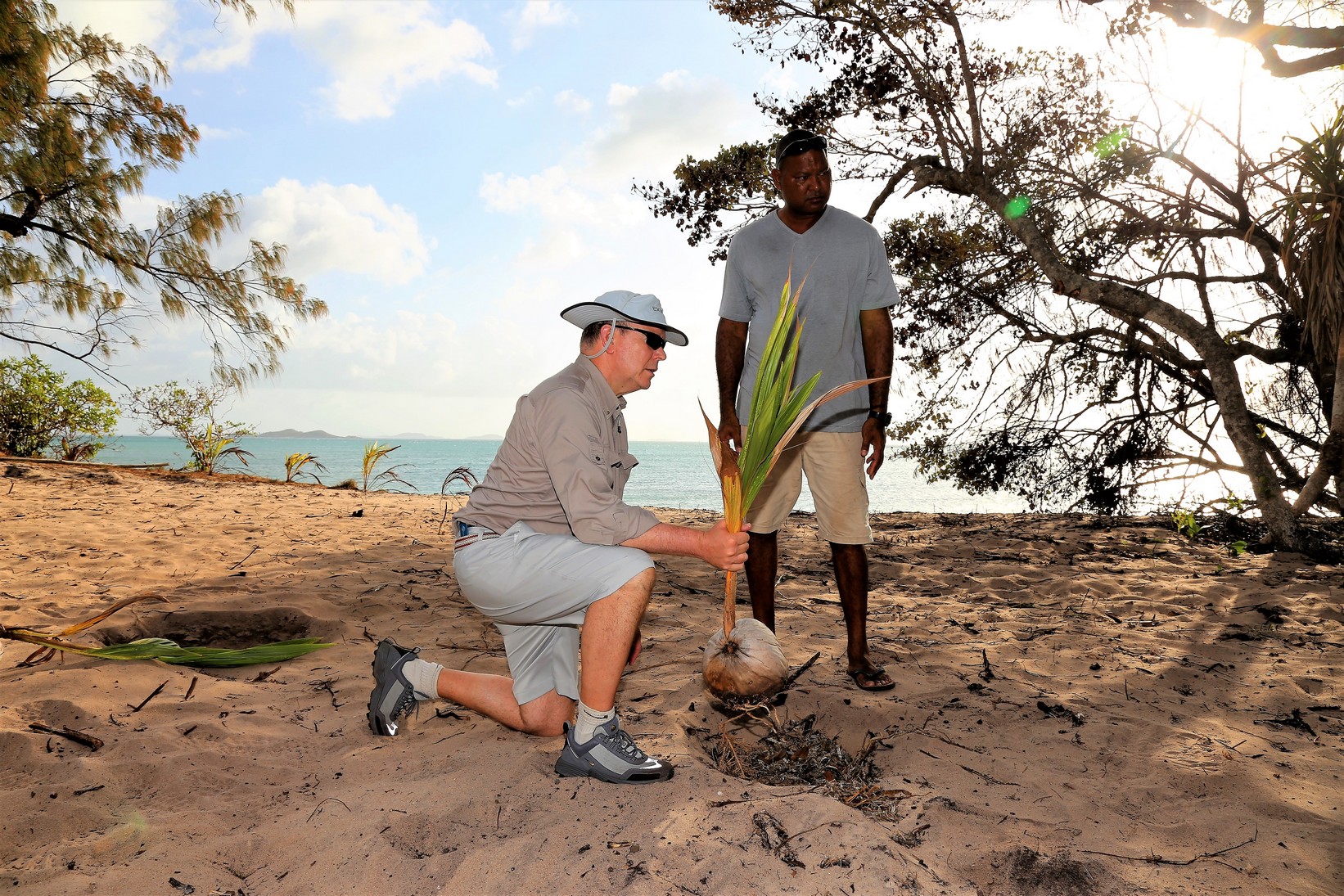
The Sovereign was invited to the primary school of Badu Island. He participated in an honorary graduation ceremony for the children of the island community. The speeches emphasized the principles bound to environmental protection, particularly the marine environment. The message consistent in all of the speeches given by the school headmaster M. Patrick Rhin, Council Representative M. Laurie Nona, and the Sovereign underlined the need to protect the future by caring for the environment. After the ceremony and the distribution of the presents brought by the Sovereign, the group posed for photos.
Early this morning the Sovereign and Alick Tipoti walked on the seashore to discuss the erosion of Badu’s coasts during the “king’s tides” and the disappearance of corals after bleaching. Badu has experienced the most severecoral bleaching in all of Australia, estimating that more than 80 % of corals died in numerous places of this part of the northern Great Barrier Reef.
This afternoon HSH Prince Albert II of Monaco arrived in Badu in Australia’s Torres Strait. He was welcomed, alongwith the Monaco Explorations team, by Councillor Laurie Nona, and Ronnie Nomoa from the “Council of Elders” with traditional song and dance from the Badu Island and a speech in the native language.
The Sovereign was welcomed by host Alick Tipoti and his family. The Tipoti’s offered him a frangipani tree flower garland, a traditional symbol of welcome from Polynesian influences.
Afterward, the Sovereign greeted the crowd who had gathered to welcome him, taking photos and enjoying the company and the emotional spirit. Because this is the first time a Head of State who is committed to highlighting the impacts of climate change on small island communities has visited Badu, the feelings of extreme gratitude for this visit were present in the crowd.
Taking advantage of his participation at the Our Ocean International Conference in Bali, Indonesia, Prince Albert II traveled to the small island of Badu in Australia for an immersion in the culture of the Torres Strait Islanders.
H.S.H. Prince Albert II, who is known for his efforts to tackle climate change and his commitment to protect the marine environment, responded to the invitation of the Torres Strait Indigenous artist and activist Alick Tipoti to discover the Torres Strait and interact with the community. The men first met at an exhibition in Monaco in April 2016, where Mr Tipoti was a featured artist at ‘Taba Naba – Australia, Oceania, Arts by Peoples of the Sea’ exhibition, hosted at the Oceanographic Museum.
Even though they live worlds apart, Alick Tipoti and H.S.H. Prince Albert II share a deep concern for the environment and have united to help protect the world’s oceans.

H.S.H. Prince Albert II discussed the relation between the Badulgul people and the sea with Elders and heard about the challenges facing remote communities like Badu Island including rising sea levels, plastic pollution in the ocean and the scourge of ‘ghost nets’ – abandoned or discarded fishing drift nets which are the invisible killers of large sea creatures like turtles, dugong, dolphins and sharks.
For three days a dialogue was opened up between the two cultures, driven by an interrogation: how do these distant societies living on an island of limited size and resources, have naturally applied for millennia a sustainable way of life, while the western world still runs after it?
The interdependence of this community with its environment (nature supports them and they strive to maintain it in return), their way of exploiting resources, their knowledge and their practice of the marine world are sources of inspiration for our modern and Western societies, as well as for the message delivered by HSH the Prince to the highest authorities.
With this mission, the Monaco Explorations show that they are not only interested in marine species and the health of the ocean, but also in the complex and diverse relationship between humans and the marine environment.
